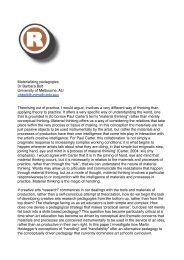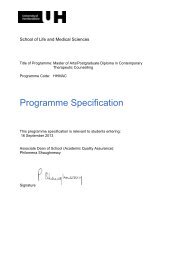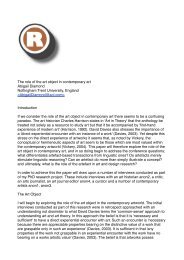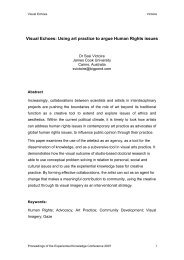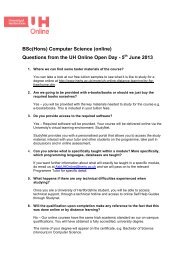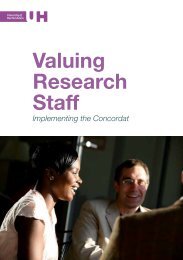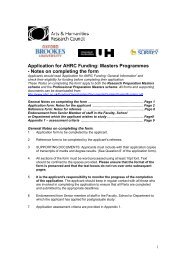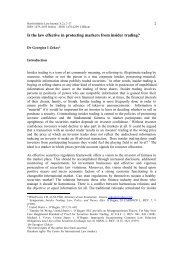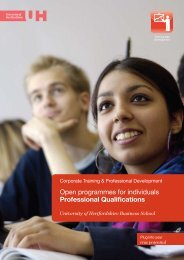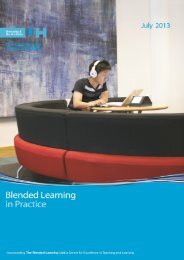Online Role Play Games â The Legal Response - University of ...
Online Role Play Games â The Legal Response - University of ...
Online Role Play Games â The Legal Response - University of ...
You also want an ePaper? Increase the reach of your titles
YUMPU automatically turns print PDFs into web optimized ePapers that Google loves.
Hertfordshire Law Journal 4(2), 72-80 72ISSN 1479-4195 <strong>Online</strong> / ISSN 1479-4209 CDRom<strong>Online</strong> <strong>Role</strong> <strong>Play</strong> <strong>Games</strong> – <strong>The</strong> <strong>Legal</strong> <strong>Response</strong>Matthew LeeAs the Internet continues to grow, so also do the arenas <strong>of</strong> social interaction. A verysurreal form <strong>of</strong> contemporary social interaction can be found amongst a novelphenomenon known as Massively Multiplayer <strong>Online</strong> <strong>Role</strong> <strong>Play</strong> <strong>Games</strong>(MMORPG’s). Numerous MMORPG’s boast <strong>of</strong> freedom <strong>of</strong> contract within theirvirtual borders. <strong>The</strong>se games, though ostensibly created for juvenile purposes, haveengrossed enterprising individuals and even businesses, to engage in them. Not fortheir prime facie entertainment value, but to pursue pecuniary interests. It is therefore,as Virtual Property (VP) crosses the virtual borders, impossible for these MMOG’s todirectly divorce themselves from real legal consequences. This essay will brieflyconsider the numerous problems caused by this international phenomenon,concentrating on debatably the biggest problem, virtual property rights. <strong>The</strong>re are twomain arguments in relation to this matter. One school <strong>of</strong> thought understandablyargues that the game users are entitled to own the virtual property. However the gameproducer’s dissent claiming that the virtual property is their property as terms theystate as much in the End User Licence Agreement (EULA). What will be determinedis which <strong>of</strong> the arguments the UK courts would follow if a legal dispute was to ariseon the matter.Though <strong>of</strong>ten forgotten it is important to bear in mind that MMORPG’s are merelycomputer games, created for entertainment purposes. MMORPGS do however, moveaway from the conventional view <strong>of</strong> what computer games actually are. MMORPG’sdo share several common elements, which deviate from other computer games. WhatMMOG’s presently <strong>of</strong>fer, which is so unique and revolutionary, is a VirtualCommunity (VC) that consists <strong>of</strong> real people from all over the world, united in virtualentertainment. A VC is a computer-simulated environment intended for its users toinhabit and interact via virtual characters:“Every day worldwide, one hundred million users log into an online game…UScitizens make up about half <strong>of</strong> the MMORPG subscribers. One fifth are fromSouth Korea, where 38 per cent <strong>of</strong> the population plays online games, andwhere, every night, more people play the MMORPG Lineage than watch TV.” 1MMORPG’s usually consists <strong>of</strong> enthralling, persistently developing story lines. <strong>The</strong>average MMORPG player spends twenty hours a week playing these games 2 . In orderto play a MMORPG an original copy <strong>of</strong> the game must be purchased on CD from alocal shop, after which a subscription fee is to be paid monthly. This monthlysubscription entitles the player to an online account, which they can use to play withinthe VC.1 Mimi Luse, <strong>The</strong> McGrill Daily, Forget fun People are earning real dollars selling imaginary items inonline games – and rewriting the law in the processhttp://www.mcgilldaily.com/view.php?aid=26352 Dibbell, Juliam. “<strong>Play</strong> Money”, Available at http://www.juliandibell.com/playmoney/index.html,2003© Matthew Lee<strong>The</strong> moral rights <strong>of</strong> the author have been asserted.Database rights <strong>The</strong> Centre for International Law (maker).
Hertfordshire Law Journal 4(2), 72-80 73ISSN 1479-4195 <strong>Online</strong> / ISSN 1479-4209 CDRomTo some the games are not just about entertainment, they form an integral part <strong>of</strong> theirlives and provide both emotional and social support. It is for this reason they havebeen criticised for being addictive in nature. 3 A player <strong>of</strong> an MMOG takes the role <strong>of</strong>a virtual character, which is an icon representing the user within the VC. Onsuccessful completion <strong>of</strong> various tasks the Virtual Character earns VP and currency,these items are intangible. <strong>The</strong> virtual character in the course <strong>of</strong> unrelenting gameplay develops in several ability areas, which give the character advantages in the VC.Such advantages include a popular status amongst other gamers and a strongerpropensity to win fictional battles. Sole game play though possible, is discouragedwhen playing the games. It would appear de facto that players are encouraged to worktogether and interact in order to develop their characters more rapidly. <strong>The</strong> furtherdeveloped a character is the more access it has to story line within the game.People are therefore constantly trying to develop their characters and will go toextreme lengths to accumulate valuable VP. <strong>The</strong> process <strong>of</strong> character development isnever ending and is accompanied with a ceaseless supply <strong>of</strong> VP. Characterdevelopment and property accrual is the most motivating element <strong>of</strong> the games andfor some is so captivating it has become their sole purpose <strong>of</strong> playing. AccumulatedVP can be traded directly with other members <strong>of</strong> the VC in return for other VP or soldfor virtual currency. <strong>The</strong>refore contracts are made all the time within the borders <strong>of</strong>the virtual communities, in regard the trade <strong>of</strong> this VP. <strong>The</strong>re exists a perfect freedom<strong>of</strong> contract within the VC borders, so there is no limit to the bargains that can be madeon the MMOG’s. This is a laudable concept never achieved, though <strong>of</strong>ten soughtafter, perfectly in the UK legal system or in numerous other countries. It thereforecontributes to the fun <strong>of</strong> the game encouraging astute trading.If indeed virtual characters and VP have a value within the virtual borders <strong>of</strong> the gamethen they will also have worth within the real world. Game users are currently sellingvirtual items at online auctions, or private websites for real money. In the opening twoweeks <strong>of</strong> April 2004 MMORPG’s moved into a whole new dimension when $156 857was traded on Ebay for the MMORPG “Ultima <strong>Online</strong>” alone 4 . <strong>The</strong> BBC wrote anastonishing article 5 on this matter were the MMORPG named “Everquest” 6 waslabelled a “virtual country” 7 and was compared to the real countries throughout theworld. It was established that “Everquest” was the seventy seventh affluent countryin the world, so is therefore richer than Bulgaria:“People are putting hundreds <strong>of</strong> hours a year into these characters and you cantell how valuable that is in terms <strong>of</strong> money by looking at how much thesecharacters sell on open markets such as auction sites like Ebay where they canfetch hundreds <strong>of</strong> US Dollars. In terms <strong>of</strong> the monetary input and the hoursinput the things that people are creating are very valuable, And that's how I got3 <strong>The</strong>re are several interesting articles on the matter. One <strong>of</strong> the most interesting can be found at:http://www.nickyee.com/daedalus/gateway_addiction.html4 Dibbell, Julian. <strong>Play</strong> Money, http://www.juliandibbell.com/playmoney/index.html, 20035 Ania Lichtarowitcz, BBC science reporter, Virtual kingdom richer than Bulgariahttp://news.bbc.co.uk/2/hi/science/nature/1899420.stm6 http://escapetonorrath.station.sony.com/7 Supra, n.1© Matthew Lee<strong>The</strong> moral rights <strong>of</strong> the author have been asserted.Database rights <strong>The</strong> Centre for International Law (maker).
Hertfordshire Law Journal 4(2), 72-80 74ISSN 1479-4195 <strong>Online</strong> / ISSN 1479-4209 CDRomto this figure that the production <strong>of</strong> value per capita in these economies issomewhere between Bulgaria's and Russia's." 8MMORPG users (MU) and MMORPG’s producers (MPr), waited apprehensively forthe outcome <strong>of</strong> the case <strong>of</strong> Blacksnow interactive v Mythic Entertainment. 9 <strong>The</strong> facts<strong>of</strong> the case were astonishing and show a clear distinction between the two conflictingviews <strong>of</strong> VP rights. Blacksnow, an enterprising company saw a clear businessopportunity available to them in the borders <strong>of</strong> the virtual worlds. What Blacksnowdid was hire a work force, or ‘Virtual sweat shop’ 10 to ironically play the MMORPG“Ultima <strong>Online</strong>” 11 on a minimum rate. Blacksnow would then sell the VP andcharacters, which their workforce had accumulated via Ebay. Blacksnow would thenkeep the ample pr<strong>of</strong>it.When mythic, the creators <strong>of</strong> Ultima <strong>Online</strong> were made aware <strong>of</strong> the venture, theyremoved all accounts, which Blacksnow had set up with them and had its Ebaylistings banned. In response to this Blacksnow sued Mythic for unfair businesspractices and took mythic to court on the matter. <strong>The</strong> argument brought by Blacksnowwas that the VP was their possession and they had a right to sell it. <strong>The</strong>y had earnedthe property through playing the game and not accumulating property byunscrupulous means. Blacksnow had also paid a great deal <strong>of</strong> money for the gameplus numerous online accounts. Mythics dissenting argument was that they had noright to sell the VP as it belonged to Mythic, as stated in the EULA. <strong>The</strong> game wasnot created for commercial purposes it was simply made for wholesomeentertainment.Disappointingly Blacksnow did not have the funding to see the case through thecourts and have a judicial decision made on the matter. <strong>The</strong> decision would have nodoubt set a good framework for how matters <strong>of</strong> this type are to be controlled. Sounavoidably, as cases <strong>of</strong> this nature begin to arise, the UK along with other countrieswill have to legislate or develop common law in order to deal with the problem <strong>of</strong> VPownership. Though virtual communities have for a long time enjoyed freedom <strong>of</strong>trade within their virtual borders, with the patent involvement <strong>of</strong> real life economiesacross the world, the MMORPG’s cannot prevent the intervention <strong>of</strong> real life law. <strong>The</strong>conflict <strong>of</strong> interests between the parties involved is clear “<strong>The</strong> extensive trade showsthat many players treat their VP as if it were their private property at the same timeEULA explicitly state that he property belongs to the game developers.” 12<strong>The</strong> argument that the rights and ownership belong to the MU is understandable whenthe MU is putting in hours <strong>of</strong> game play every day and is paying money to win the VPand develop their character. If they then wish to sell their hard earned virtual assets8 Pr<strong>of</strong>essor Edward Castronova, California State <strong>University</strong> at Fullerton,http://news.bbc.co.uk/2/hi/science/nature/1899420.stm9 <strong>The</strong> case was Blacksnow Interactive v. Mythic Entertainment, Inc., No. 02–cv–00112 (C.D. Cal.2002). An interesting report can be found in Julian Dibbell, “Surfing the Web: Black Snow Interactiveand the World’s First Virtual Sweat Shop,” Wired, volume 11, issue 1, athttp://www.juliandibbell.com/texts/blacksnow.html.10 Ibid11 http://www.uo.com/12 Kalle Grill and Anders Eriksson, who owns my avatar? – Rights in virtual propertyhttp://ir.lib.sfu.ca/handle/1892/1573© Matthew Lee<strong>The</strong> moral rights <strong>of</strong> the author have been asserted.Database rights <strong>The</strong> Centre for International Law (maker).
Hertfordshire Law Journal 4(2), 72-80 75ISSN 1479-4195 <strong>Online</strong> / ISSN 1479-4209 CDRomperhaps they should be able to do so without intervention. This to the casual observerseems to cause no detriment to the MPr who still benefits from money collected overthe months <strong>of</strong> game play and original game purchase.<strong>The</strong> original game that is bought is undisputedly the property <strong>of</strong> the MU. <strong>The</strong> MU isgiven permission to sell the game, if they so wish. A typical MMORPG EULA 13provides that:“You may permanently transfer ownership <strong>of</strong> the Game and all parts there<strong>of</strong>,and all <strong>of</strong> your rights and obligations under the License Agreement, to anotherby physically transferring the CD-ROM, all original packaging, and all Manualsor other documentation associated with the Game, and by removing from all <strong>of</strong>your home or personal computers and destroying any remaining materialsconcerning the Game in your possession or control, provided the recipientagrees to the terms <strong>of</strong> this License Agreement.” 14So being established that the original game can legally be sold perhaps game usersshould also be able to sell with it the online account they made with the gamingcompany and any virtual characters or property they have attained. Removingproperty rights from a MU may seem ethically morally erroneous. If to gamers VPhas the same sentiment as tangible property then it would seem inequitable to notallow them to keep this property. Especially if the MU have formed this sentimentalattachment under the assumption that the property is their own. This may encouragethe courts to take a sympathetic view towards the issue.This argument is understandable, but is not uncontroversial. <strong>The</strong>re are problems,which arise following this reasoning. By allowing MU the rights and ownership <strong>of</strong>VP, floodgates are opened to business and other commercial based individuals tounreservedly dominate the virtual economy. <strong>Play</strong>ing the games in order to generatemoney alone, making the games no longer a platform <strong>of</strong> virtual entertainment but acash cow.With VP invested in the VC, Game producers will be under legal obligation to keeptheir games running ad infinitum. If for whatever reason the VC ceases to operate,whether by problems in the programming or another unforeseeable intervention. <strong>The</strong>nthe game producers could seemingly be taken to court and be ordered to paycompensation to all businesses or individuals claiming a loss. With the literallymillions <strong>of</strong> people who now pr<strong>of</strong>ess to play these games, this would seem technicallyimpossible.A related case 15 was recently heard in the Beijing Chaoyang District Peoples Court inChina. <strong>The</strong> Chinese judiciary were asked to review the first VP rights dispute case.13 This EULA is taken from one <strong>of</strong> the most popular MMORPG’s at the moment called “World <strong>of</strong>Warcraft” on examining numerous EULA’s <strong>of</strong> MMORPG’s they have expressed this point the same,however is worded differently. http://www.world<strong>of</strong>warcraft.com/legal/14 EULA, 3.ownership (B)http://www.world<strong>of</strong>warcraft.com/legal/eula.html;jsessionid=ECC51AB145CD234F5A425653C11D9C9A.08_app0115 Li Hongchen v Beijing Artic Ice Technology Developmenthttp://www.technewsworld.com/story.32441.html.© Matthew Lee<strong>The</strong> moral rights <strong>of</strong> the author have been asserted.Database rights <strong>The</strong> Centre for International Law (maker).
Hertfordshire Law Journal 4(2), 72-80 76ISSN 1479-4195 <strong>Online</strong> / ISSN 1479-4209 CDRomThis intriguing case involved a 24-year-oldman named Li Hongchen who was adedicated player <strong>of</strong> a MMORPG called “Redmoon” 16 . Through Mr Hongchen’s time,effort and money, he had managed to accumulate, inter alia, virtual biochemicalweapons. <strong>The</strong> virtual weapons formed an integral part <strong>of</strong> the game play and hadextreme value to Mr Hongchen. Not only were the virtual items <strong>of</strong> great sentimentalvalue to Mr Hongchen but he had also spent money to gain them. Mr Hongchen’s VPwas stolen by a hacker and he wanted remedy for his loss.<strong>The</strong> judge made an interesting decision. “Blaming security holes in the servers <strong>of</strong>online gaming company Beijing arctic ice technology Development Company, thecourt held the company liable for the theft <strong>of</strong> the Hongchen’s hard-earned game itemsand status. In addition to rearming the gamer, who unsuccessfully lobbied thecompany and even police in the matter, it is not clear whether or not arctic ice alsowill have to damages claimed by LI.” 17It can be argued that the judge’s decision to replace the VP that Mr Honchan lost wasa comprehensible indication that the property was de facto owned by Mr Hongchanthe MU and was not the property <strong>of</strong> the MPr. This argument would be furtherestablished if Mr Hongman is also awarded damages. However it can be morestrongly argued that there was no need to make a distinction in this case <strong>of</strong> whoowned the VP. Mr Hongchen had suffered a patent loss but this does not mean that heneeded to own the property to incur this loss. When a car is rented for a period <strong>of</strong> timeand then breaks during that time the party which rented the car has suffered a loss andis entitled to remedy however still does not own the car. Though not addressing theissue <strong>of</strong> VP directly, this may still give a good indication <strong>of</strong> how the courts couldhandle a complaint <strong>of</strong> this nature.<strong>The</strong> argument that the MU should be the rightful owners <strong>of</strong> his respective VP is notonly put forth by the MU alone, but is also shared by certain MPr’s who feel that bynot allowing the MU’s to own VP they are in effect pushing them away from the VCand will in the long term loose revenue for the MPr.Likewise the contrasting view thatthe rights belong to the MPr is commonly shared. <strong>The</strong>re are certain MU andauthoritarian MPr’s who take a domineering view towards the VP rights andownership. What the producers argue is certainly the original game has beenpurchased and is, therefore the property <strong>of</strong> the MU, which he is legally entitled to sell.However the VP forms part <strong>of</strong> an online VC supervised and controlled by the gamecreators. It is therefore not given to the MU as a possession but is on loan fortemporary use and can therefore be retracted at any time. Indisputably:“One can rent a house, decorate it with the full permission <strong>of</strong> the owner, live init for five years, fill the garden with flowers, insulate the l<strong>of</strong>t, do a whole bunch<strong>of</strong> other things, without acquiring the right to sell the house.” 1816 www.redmoon.com17 Lywan, Jay, Gamer wins lawsuit in Chinese court over stolen Virtual Winnings, TechNewsWorld,http://www.technewsworld.com/story.32441.html.18 Bartle, Richard. ”Pitfalls Of Virtual Property”, <strong>The</strong>mis Group, 2004© Matthew Lee<strong>The</strong> moral rights <strong>of</strong> the author have been asserted.Database rights <strong>The</strong> Centre for International Law (maker).
Hertfordshire Law Journal 4(2), 72-80 77ISSN 1479-4195 <strong>Online</strong> / ISSN 1479-4209 CDRomThis argument is essentially a valid one. <strong>The</strong> courts would not give full propertyrights to a tenant <strong>of</strong> a rented house just because they had put effort into the house andtherefore added value. However it is still not certain that VP possession can beequated with the well-grounded rules <strong>of</strong> tenancy.MPr’s have taken steps to legally retain possession <strong>of</strong> all VP, with the use <strong>of</strong> EULA.When a MMORPG is purchased and the purchaser wishes to play the game onlinewithin the VC, they must agree to the terms and conditions displayed on their screen.In order to proceed to the game play they must click the “I Accept” button. A typicalEULA will give a clear warning at the beginning <strong>of</strong> the game stating somethingsimilar to “You should carefully read the following end user license agreement beforeinstalling this s<strong>of</strong>tware program. By installing, copying or otherwise using thes<strong>of</strong>tware program, you agree to be bound by the terms <strong>of</strong> this agreement.” 19 It seemsthat EULA’s are to be enforced by the courts:“<strong>The</strong> action <strong>of</strong> clicking the icon…can be construed as demonstrating the intentto enter the contact with the retailer. In itself, this has the effect <strong>of</strong> satisfying thefunction <strong>of</strong> a signature.” 20<strong>The</strong> Law Commission also take an interesting view comparing the electronicsignature to one done on a manuscript using a cross. 21 So seemingly clicking the “IAccept” button is the same as signing a contract and therefore will follow the samerules this would mean that it does not matter if the contract terms have been read andunderstood, the game users are still legally bound to them. 22<strong>The</strong> terms the Game producers put into their EULA to protect virtual property rightswill state “All title, ownership rights and intellectual property rights in and to theGame and all copies there<strong>of</strong> (including, but not limited to, any titles, computer code,themes, objects, characters, character names, stories, dialog, catch phrases, locations,concepts, artwork, character inventories, structural or landscape designs, animations,sounds, musical compositions, audio-visual effects, storylines, character likenesses,methods <strong>of</strong> operation, moral rights, any related documentation, and "applets"incorporated into the Game) are owned or expressly licensed by Licensor.” 23So following this line <strong>of</strong> reasoning the courts would find that the terms, the MPr’shave incorporated into the EULA, are valid and therefore the VP belongs indisputablyto the MPr’s. <strong>The</strong> MU’s accepted these terms with an electronic signature. Thoughlegally coherent this line <strong>of</strong> reasoning is not unproblematic. In contrast, it can beargued that the courts will not be prepared to enforce the EULA in all their terms andsituations. <strong>The</strong> courts do seem to recognise these licences as they do generally reflectvalid trade practices. However if the need arises, courts still have the power tointerpret them in favour <strong>of</strong> the MU.19 This EULA is taken from a very popular MMOG at the moment called World <strong>of</strong> Warcraft. <strong>The</strong> fullEULA and other legal documentation in relation to this MMOG may be found at:http://www.world<strong>of</strong>warcraft.com/legal/20 Stephen Mason, Electronic Signature in Law p.81 s.3.1421 Law commission ‘electronic commerce: Formal Requirements in commercial transactions advicefrom the law commision’, December2001, para 3.37; see also paras 3.36 and 3.38.22 Paul Todd, E-Commerce Law. P.18523 Supra n.19© Matthew Lee<strong>The</strong> moral rights <strong>of</strong> the author have been asserted.Database rights <strong>The</strong> Centre for International Law (maker).
Hertfordshire Law Journal 4(2), 72-80 78ISSN 1479-4195 <strong>Online</strong> / ISSN 1479-4209 CDRomAn interesting dilemma also arises in regard to the EULA If a prospective MUpurchases an MMORPG then takes it home, opens the product and attempts to installit. <strong>The</strong> MMORPG then loads and the prospective MU is presented with the EULA onthe screen, which demands an acceptance to the terms before the game can be played.<strong>The</strong> prospective game user subsequently realises that he will not be entitled to ownthe virtual property within the game. On realising this, the prospective MU loosesinterest in playing the game and due to an increase in recent times <strong>of</strong> game piracy isnot allowed to return it once the package is opened. <strong>The</strong>refore the prospective MU hasincurred a loss as the original game, which he has purchased, is <strong>of</strong> no use to him.<strong>The</strong> injustice <strong>of</strong> the situation is that the EULA terms are not made clear to theprospective MU until after the games have been purchased. <strong>The</strong>refore the prospectiveMU has no way <strong>of</strong> knowing that the terms <strong>of</strong> the MMORPG without a great exertion.It is established in the common law and shown in several cases including Olley vMarlborough Court Hotel 24 and Chapleton v Barry 25 that terms must be brought tothe attention <strong>of</strong> the contracting party prior to the time the contract is being made.<strong>The</strong>refore the EULA should not be produced as the game is being installed but shouldbe clearly identified to the purchaser at the time <strong>of</strong> purchasing. So arguably the courtswill not enforce the terms <strong>of</strong> EULA as they have not satisfied this condition.In addition to this, the process <strong>of</strong> clicking the “I accept” button may be seen similar toa signature 26 or even a cross 27 , however there are still several important factors, whichdistinguish them. A written signature is “your name written by yourself, always in thesame way, usually to show that something has been written or agreed by you” 28 Thisdefinition <strong>of</strong> a signature is fundamentally different from what is presented by andEULA. <strong>The</strong> point that the signature “is always in the same way” is a security measure,which, though not perfect, can help to ensure that the person signing is who theyclaim to be. By having a button, which just says, “I accept” there is a clearopportunity for people to misrepresent who they are. It also provides an easy way forjuvenile to accept, which are incapable <strong>of</strong> understanding the EULA.Another problem which arises with the use <strong>of</strong> “I accept” buttons is that many peoplehave spent a lot <strong>of</strong> time shopping online and using s<strong>of</strong>tware all <strong>of</strong> which require the “Iaccept” button to be clicked. It has therefore become such a common thing to some, tojust skip past the “I accept” button without paying any regard for the terms which arecontained on the EULA.Perhaps in this case it would be better to not compare the “I accept” button with asignature but to compare it with an everyday transaction, for example buying goodsfrom a store. When goods are purchased from a store it is not expected that asignature be placed on every transaction. If this reasoning is accurate the clicking <strong>of</strong>the “I accept” button will not follow the harsh rule <strong>of</strong> L’Estrange v Graucob 29 , whichon signing binds the parties by the contract terms regardless <strong>of</strong> if they are read or not.24 Olley v Marlborough Court Hotel [1949] 1 KB 53225 Chapleton v Barry UDC [1940] 1 KB 53226 Supra n.2027 Supra n.2128 Cambridge online dictionary definition29 L’Estrange v Graucob [1934] 2 KB 394© Matthew Lee<strong>The</strong> moral rights <strong>of</strong> the author have been asserted.Database rights <strong>The</strong> Centre for International Law (maker).
Hertfordshire Law Journal 4(2), 72-80 79ISSN 1479-4195 <strong>Online</strong> / ISSN 1479-4209 CDRomIf VP belongs to the MPr, this would mean that there are currently thousands <strong>of</strong> illegaltransaction taking place everyday across the world. People are selling VP, which isnot theirs to sell. As demonstrated in the Blacksnow case 30 there are some people whoare prevented from trade, however there are still a large number who aren’t.Not all MMORPG have a EULA that explicitly states that the virtual property belongsto the game producer. Recently a MMORPG named “Project Entropia” has beenreleased which encourages the trade <strong>of</strong> VP with Real money trade this is clearly statedon the website “<strong>The</strong> client s<strong>of</strong>tware is free to download over the Internet and there areno subscription fees associated whatsoever. <strong>The</strong> real cash economy means that theinternal Project Entropia economy is linked to the real world economy, by using acurrency called the Project Entropia Dollar (PED), which has a fixed exchange ratelinked to the US Dollar (10 PED equals 1 USD). As a participant, you use PED toacquire virtual land and equipment in Project Entropia, thereby investing in youravatar’s (Participant representation in the virtual universe) growth and abilities. Aunique aspect <strong>of</strong> Project Entropia is that a player may elect to transfer PED back intoreal life currency, thereby enabling them to earn real money while participating in theonline virtual universe <strong>of</strong> Project Entropia.” 31This astonishing point <strong>of</strong> the game is arguably the key to this problem <strong>of</strong> Virtualproperty rights. This game has clearly notified the user that virtual property obtainedis the possession <strong>of</strong> the user. It is not an onerous term hidden in EULA but is clear.Once this has been read the prospective MU can then download the game. So he isaware <strong>of</strong> whom the VP belongs before the contract is formed. <strong>The</strong>refore if a case is tocome to court in regards to Project Entropia on the point <strong>of</strong> VP rights it is clear thatthe judges will know to whom the property belongs.In regards to all other MMORPG,s as they currently stand the UK courts will not besympathetic to them and give them complete ownership <strong>of</strong> the VP. <strong>The</strong> EULA’s makeit clear to whom the property belongs however by the MPr’s failure to notify the MU<strong>of</strong> the terms, before the products bought. <strong>The</strong> courts will not enforce the term.<strong>The</strong> MPr’s can prevent this from happening by making the point clear before thegame is purchased clear immediately and not after the game has been purchased. Thiswould call for several points <strong>of</strong> reform in the current system. If made clear before thegame is purchased this. <strong>The</strong>n prospective MU’s will have an opportunity to decidewhether or not the game satisfies their requirements. It will then be a lot harder forthem to claim that they were not made aware <strong>of</strong> the term.A business or enterprising individual who has pecuniary interests in the game canthen use the games to generate money. As it will be clearly distinguishable whichgames allow this and which don’t. This has been achieved in the game “ProjectEntropia” <strong>The</strong>y can take the opportunity to play the games for the sole purpose <strong>of</strong>generating money without having their account removed.<strong>The</strong> MU which has interests in owning his own VP due to sentiment will also besatisfied by this. <strong>The</strong>y will have the opportunity to keep any virtual property30 Supra, n.931 http://www.project-entropia.com/about/Index.ajp© Matthew Lee<strong>The</strong> moral rights <strong>of</strong> the author have been asserted.Database rights <strong>The</strong> Centre for International Law (maker).
Hertfordshire Law Journal 4(2), 72-80 80ISSN 1479-4195 <strong>Online</strong> / ISSN 1479-4209 CDRomaccumulated. Likewise the MU who believes that the game should enjoy anindependent environment free from real life economies will be satisfied.<strong>The</strong>re are still numerous interesting problems brought about by MMORPGs only thesurface has been scratched. <strong>The</strong>se may include several problems involved with theuncensored speech that goes on within the game borders as the game is playedinternationally, each country having different laws in relation to freedom <strong>of</strong> speech.Also taxation problems associated with transfer <strong>of</strong> VP. Certainly as the industrycontinues to grow the virtual borders separating MMORPG’s from the real worldcontinues to be crossed. Laws will inevitably have to be created to control the VPtrade.© Matthew Lee<strong>The</strong> moral rights <strong>of</strong> the author have been asserted.Database rights <strong>The</strong> Centre for International Law (maker).



